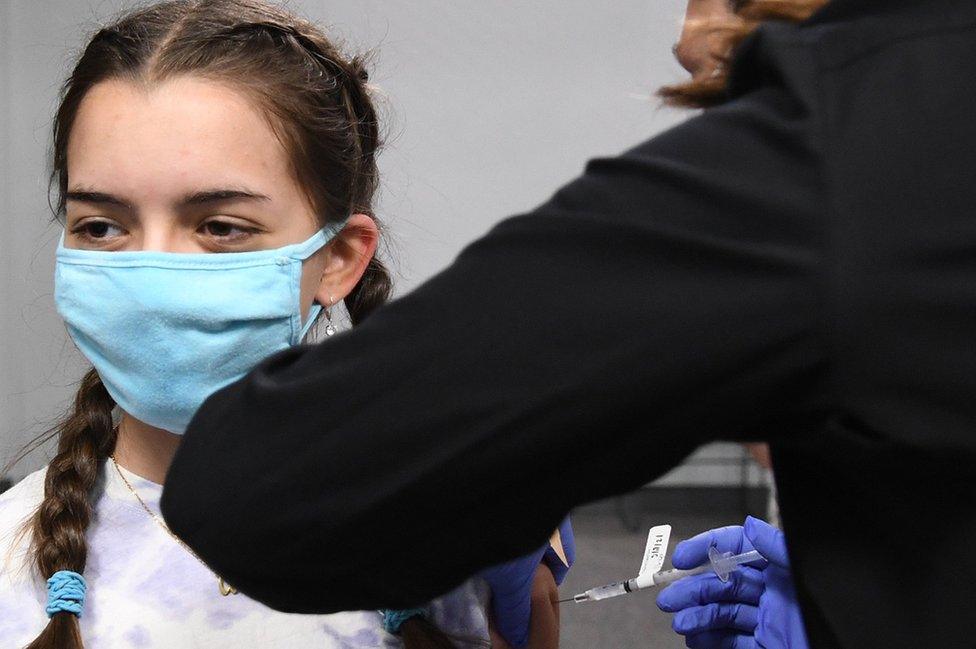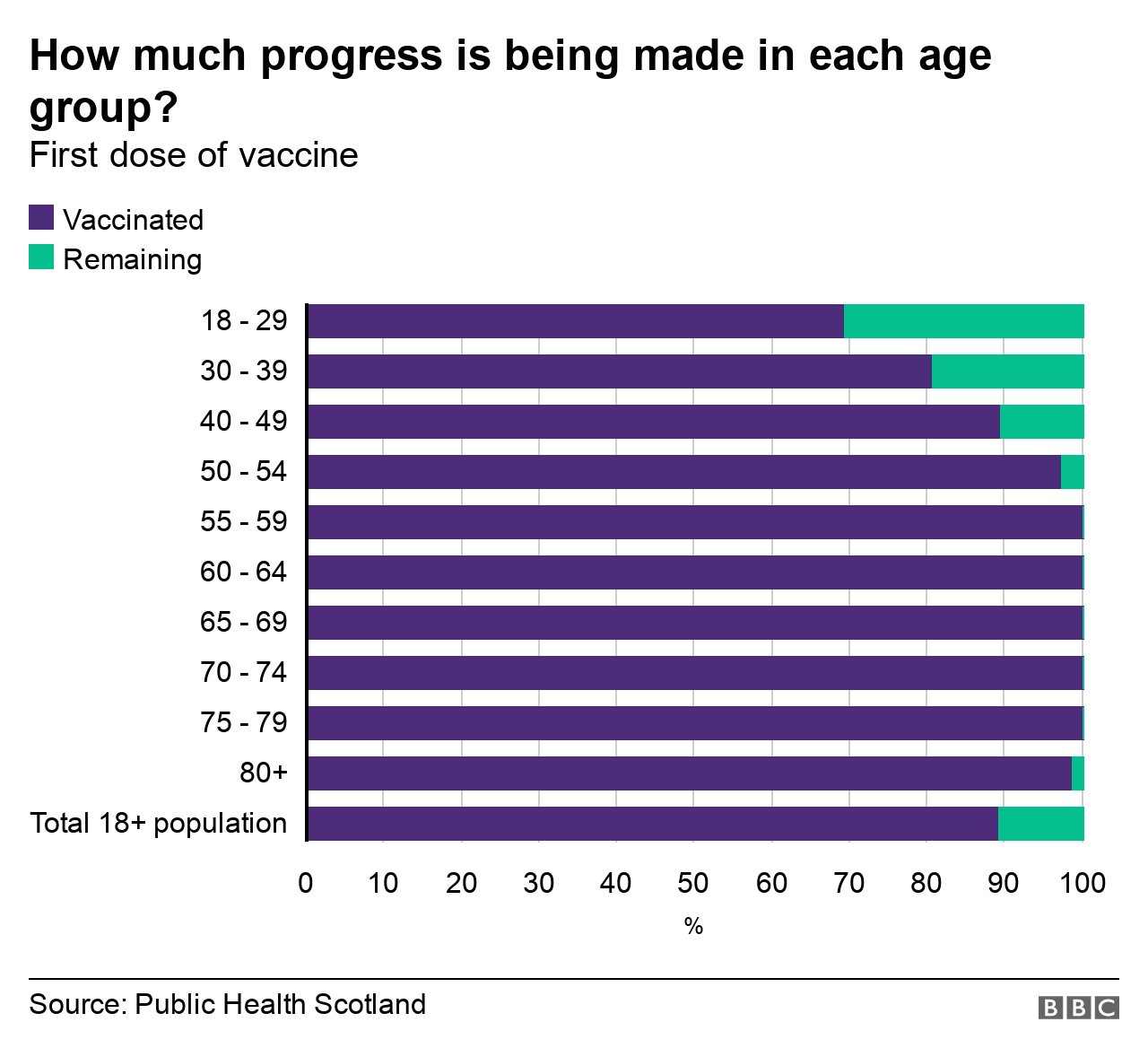Covid in Scotland: Sturgeon says not to rule out vaccinating younger teens
- Published
Covid in Scotland: Vaccinating younger teens 'should not be ruled out'
First Minister Nicola Sturgeon has urged the UK vaccines authority not to "rule out" offering all teenagers a Covid-19 jab.
Children over 12 who are at higher risk of falling ill from the virus are to be added to the vaccine programme.
But the UK's Joint Committee on Vaccination and Immunisation (JCVI) said there would be little benefit in doing this for all young people.
Ms Sturgeon said it was "extremely important" this was kept under review.
The Scottish government is to follow the JCVI advice - which is to offer doses to children with certain health conditions and those who live with other vulnerable people.
But chief medical officer Dr Gregor Smith has written to the group asking that the matter be kept under "close and ongoing review".
The JCVI conducted a study of whether children aged 12 to 17 should all be offered a Covid-19 vaccine.
They concluded that those with severe neurodisabilities, Down's syndrome, a severely weakened immune system or profound learning disabilities should be offered a jab - along with over-12s who live with someone with a weak immune system.
However, the group stopped short of recommending that all teens should be included in the vaccine drive.
Prof Anthony Harnden, the group's deputy chairman, said: "The primary aim of the vaccination programme has always been to prevent hospitalisations and deaths.
"Based on the fact that previously well children, if they do get Covid-19, are likely to have a very mild form of the disease, the health benefits of vaccinating them are small."

Other countries including the US and Canada have added children aged 12 to 17 to their mass vaccination programmes, and Ms Sturgeon said it was important to learn from developments there.
She said: "The Scottish government has always followed the advice of the JCVI, and for good reason.
"But I am acutely aware that some other countries are vaccinating younger teenagers, and I certainly consider it to be extremely important that this is not ruled out here.
"The chief medical officer is writing to the JCVI asking that the benefit of vaccinating all 12 to 17-year-olds is kept under close and ongoing review and that it takes account of all available data from countries already doing this.
"I think that is really important - if there is a benefit to be got from vaccinating younger teenagers then it's really important that younger people do not miss out on that."

Young people who are eligible will be offered the Pfizer-BioNTech vaccine, as it is the only one approved for use in children aged 12 to 17 in the UK.
Vulnerable 16 and 17-year-olds were already able to get the vaccine, while teenagers within three months of their 18th birthday will also be offered a jab - with the aim of protecting school leavers before they start work or university.
Fewer than 30 children have died with Covid-19 in the UK, and the JCVI also says the benefit of vaccinating children to stop them spreading the virus to older age groups is unclear with so many vulnerable adults already fully immunised.
The Scottish government is encouraging more young people to come forward for vaccination, with the 18 to 29 age group and young men in particular less likely to have had a jab.


The JCVI has concluded that until there is more safety data on vaccines in children then it is best only to offer it to those for whom there is a direct benefit.
It says the vast majority of children will experience mild illness if they contract Covid, so at this moment in time the chance of rare vaccine side effects is a greater risk.
But there is not universal consensus on this view. Some experts say that more attention should be paid to the possible complications of long Covid in children and the use of vaccines to stem the spread of coronavirus.
The Scottish government has always accepted the advice of the JCVI and will continue to do so here, but the country will face challenges first.
Schools go back earlier here and Scotland generally has higher numbers of under-18s starting college or university than other parts of the UK. That could lead to a very disrupted start to term and some students feeling like they are unprotected as they move into halls of residence.
Given some other countries are already routinely vaccinating 12-18 year olds, this is one reason why the chief medical officer is writing to the JCVI asking for the decision to be regularly and closely reviewed.

Ms Sturgeon said that "each and every person who gets jagged helps us take a step back to normality", and that any groups who do not do so present a "vulnerability against the virus".
She said: "Covid is less of a threat to young people, but that doesn't mean it poses no threat at all.
"Some young people do need hospital care when they get the virus, some can even end up in intensive care, and as we know young people can get long Covid - which we still don't fully understand the implications of.
"So please get vaccinated as soon as you possibly can. If you know somebody in a younger age group in your own family who hasn't had the vaccine yet, please encourage them to do so.
"It is the single most important thing any of us can do right now to give protection to ourselves, to protect others, and to help all of us collectively get back to normality."
'Clear and obvious issues'
Opposition parties have called on the Scottish government to do more to push through the final phases of the programme.
Scottish Conservative leader Douglas Ross questioned the decision to close the NHS Louisa Jordan vaccination hub at the SSE Hydro in Glasgow.
He said: "I think we have got to look at opportunities for getting people vaccinated in every part of Scotland and that means keeping the Hydro and other vaccination centres open."
And Labour's Daniel Johnson said there were still problems with inviting people for jabs, saying some were still not receiving blue letters.
He said: "I think there are clear and obvious issues that we never got to the bottom of in terms of how the vaccination programme has been operating, particularly around communication. We need to grapple with those and deal with them instead of brushing them aside."

